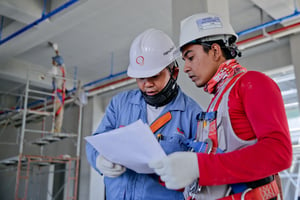Web3, smart contracts - what construction can do to prepare

The construction industry is one of the most important industries in the United Kingdom. It employs millions of people across all levels and contributes billions to the economy every year. However, the industry is also one of the most outdated and inefficient, even despite much of the technological progress it has made. With the slow release of Web3 and smart contracts, many of these issues can be mitigated, streamlined, or even removed.
But what are Web3 and smart contracts?
Web3 is the name given to what is supposed to be the third iteration of the web, with us currently being in Web2. Web3 is powered by decentralised blockchain technology and promises to bring a new level of transparency and security to the internet - no more leaked passwords and immoral data capture. Web 3 is still in its early days, and there’s sure to be plenty of development in the years to come. But one thing’s for sure – the future of the web is looking bright!
The advent of blockchain technology has brought with it the possibility of implementing Smart Contracts. These contracts are self-executing and can automatically enforce the terms of an agreement without the need for third-party intermediaries.
The above has the potential to revolutionize a number of industries, including finance, healthcare, logistics and yes – construction.
Blockchain technology can be used to manage projects and construction data, thus improving transparency and trust in the industry as a whole. We also look at the potential for using smart contracts in construction, and how they could streamline and potentially automate the contracting process and removing intermediaries such as lawyers or accountants. By removing the need for third-party intermediaries, it can reduce costs and speed up the construction process.
However, before any of the above can be implemented the construction industry must take a number of steps to best make use of these new opportunities.
One of the main challenges is ensuring that the data stored on the blockchain is accurate and reliable. With so many moving parts revolving around a single project, and with even small contractors often having a few projects at once this could be an issue that only multiplies when scaling up to the bigger contractors. This is made even more difficult when considering that data is often communicated between contractors that do not have efficient channels of communication set up. Having a foundation of unreliable data could have a huge impact, especially in the early days of these new technologies.
Another challenge is ensuring that the smart contract code is bug-free. Even a single hiccup can cause all operations to grind to a halt or cause major legal consequences, so this is vital.
There are a number of companies that are working on solving these issues. For example, Microsoft has developed a platform called Azure that allows developers to create and deploy Smart Contracts. Other companies that are working on this technology include IBM and Ethereum.
Streamlining and fixing current processes as early as possible is critical. Most contractors are keenly aware of where their issues lie and fixing them early will make the coming change much easier to handle. The most important thing is to ensure these processes are working for you and your company, as well as its goals and for your teams.
Any unresolved issues with areas such as cash flow, paperwork, or timing will become even harder to fix as they become hardwired into an unyielding blockchain, only compounding the problem further.
The companies that lean in now and figure out how they’re going to adapt to advances in tech are going to be the ones who thrive in the future. Making these considerations now will give you a competitive advantage in the long run.



